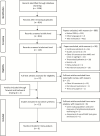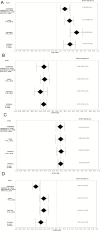Associations of Awareness of Age-Related Change With Emotional and Physical Well-being: A Systematic Review and Meta-analysis - PubMed (original) (raw)
Meta-Analysis
Associations of Awareness of Age-Related Change With Emotional and Physical Well-being: A Systematic Review and Meta-analysis
Serena Sabatini et al. Gerontologist. 2020.
Abstract
Background and objectives: This systematic review aimed to synthesize and quantify the associations of awareness of age-related change (AARC) with emotional well-being, physical well-being, and cognitive functioning.
Research design and methods: We conducted a systematic review with a correlational random effects meta-analysis. We included quantitative studies, published from January 1, 2009 to October 3, 2018, exploring associations between AARC and one or more of the following outcomes: emotional well-being, physical well-being, and cognitive functioning. We assessed heterogeneity (I2) and publication bias.
Results: We included 12 studies in the review, 9 exploring the association between AARC and emotional well-being and 11 exploring the association between AARC and physical well-being. No study explored the association between AARC and cognitive functioning. Six articles were included in the meta-analysis. We found a moderate association between a higher level of AARC gains and better emotional well-being (r = .33; 95% CI 0.18, 0.47; p <.001; I2 = 76.01) and between a higher level of AARC losses and poorer emotional (r = -.31; 95% CI -0.38, -0.24; p < .001; I2 = 0.00) and physical well-being (r = -.38; 95% CI -0.51, -0.24; p < .001; I2 = 83.48). We found a negligible association between AARC gains and physical well-being (r = .08; 95% CI 0.02, 0.14; p < .122; I2 = 0.00). Studies were of medium to high methodological quality.
Discussion and implications: There is some indication that AARC gains and losses can play a role in emotional well-being and that AARC losses are associated with physical well-being. However, the number of included studies is limited and there was some indication of heterogeneity.
Prospero registration: CRD42018111472.
Keywords: Aging; Awareness; Cognition; Health, Meta-analysis; Review.
© The Author(s) 2019. Published by Oxford University Press on behalf of The Gerontological Society of America.
Figures
Figure 1.
Preferred Reporting Items for Systematic Reviews and Meta-Analysis (PRISMA) 2009 flow diagram.
Figure 2.
Forest plot of the associations between awareness of age-related change (AARC) (gains and losses) and measures of emotional and physical well-being. (a) Forest plot of the associations between AARC gains and measures of emotional well-being. (b) Forest plot of the associations between AARC losses and measures of emotional well-being. (c) Forest plot of the associations between AARC gains and measures of physical well-being. (d) Forest plot of the associations between AARC losses and measures of physical well-being. Combined = effect sizes of Kaspar et al. (2019), Brothers et al. (2016), and Dutt et al. (2018) were combined; Overall = overall effect size of the five studies included in the meta-analysis.
Similar articles
- Testing Bidirectionality in Associations of Awareness of Age-Related Gains and Losses With Physical, Mental, and Cognitive Functioning Across 1 Year: The Role of Age.
Sabatini S, Wahl HW, Diehl M, Clare L, Ballard C, Brooker H, Corbett A, Hampshire A, Stephan BCM. Sabatini S, et al. J Gerontol B Psychol Sci Soc Sci. 2023 Dec 6;78(12):2026-2036. doi: 10.1093/geronb/gbad150. J Gerontol B Psychol Sci Soc Sci. 2023. PMID: 37801677 Free PMC article. - Self-reported hearing and awareness of age-related change : A domain-specific perspective.
Wettstein M, Kornadt A, Heyl V, Wahl HW. Wettstein M, et al. Z Gerontol Geriatr. 2023 Jul;56(4):269-275. doi: 10.1007/s00391-023-02171-6. Epub 2023 Mar 29. Z Gerontol Geriatr. 2023. PMID: 36988667 Review. English. - Cross-sectional association between objective cognitive performance and perceived age-related gains and losses in cognition.
Sabatini S, Ukoumunne OC, Ballard C, Collins R, Anstey KJ, Diehl M, Brothers A, Wahl HW, Corbett A, Hampshire A, Brooker H, Clare L. Sabatini S, et al. Int Psychogeriatr. 2021 Jul;33(7):727-741. doi: 10.1017/S1041610221000375. Epub 2021 Apr 14. Int Psychogeriatr. 2021. PMID: 33849677 - Awareness of Age-Related Gains and Losses and Their Associations With Psychological Well-Being: A Longitudinal Examination.
Wilton-Harding B, Windsor TD. Wilton-Harding B, et al. J Gerontol B Psychol Sci Soc Sci. 2022 Apr 1;77(4):661-672. doi: 10.1093/geronb/gbab155. J Gerontol B Psychol Sci Soc Sci. 2022. PMID: 34411232 - Exploring the relationship between cognitive illness representations and poor emotional health and their combined association with diabetes self-care. A systematic review with meta-analysis.
Hudson JL, Bundy C, Coventry PA, Dickens C. Hudson JL, et al. J Psychosom Res. 2014 Apr;76(4):265-74. doi: 10.1016/j.jpsychores.2014.02.004. Epub 2014 Feb 21. J Psychosom Res. 2014. PMID: 24630175 Review.
Cited by
- Awareness of age-related change, chronological age, subjective age and proactivity: An empirical study in China.
Zhang W, Wood S. Zhang W, et al. Front Psychiatry. 2022 Sep 29;13:915673. doi: 10.3389/fpsyt.2022.915673. eCollection 2022. Front Psychiatry. 2022. PMID: 36245881 Free PMC article. - Differences in awareness of positive and negative age-related changes accounting for variability in health outcomes.
Sabatini S, Ukoumunne OC, Brothers A, Diehl M, Wahl HW, Ballard C, Collins R, Corbett A, Brooker H, Clare L. Sabatini S, et al. Eur J Ageing. 2022 Feb 4;19(4):1087-1097. doi: 10.1007/s10433-021-00673-z. eCollection 2022 Dec. Eur J Ageing. 2022. PMID: 36506661 Free PMC article. - The Effects of Age Stereotypes on Physical and Mental Health Are Mediated by Self-perceptions of Aging.
Brothers A, Kornadt AE, Nehrkorn-Bailey A, Wahl HW, Diehl M. Brothers A, et al. J Gerontol B Psychol Sci Soc Sci. 2021 Apr 23;76(5):845-857. doi: 10.1093/geronb/gbaa176. J Gerontol B Psychol Sci Soc Sci. 2021. PMID: 33057726 Free PMC article. - Awareness of age-related changes in Norwegian individuals 50+. Short form questionnaire validation.
Testad I, Ushakova A, Aakre JA, Sabatini S, Gjestsen MT. Testad I, et al. Front Psychiatry. 2022 Nov 10;13:929249. doi: 10.3389/fpsyt.2022.929249. eCollection 2022. Front Psychiatry. 2022. PMID: 36440418 Free PMC article. - The cross-sectional relationship between pain and awareness of age-related changes.
Sabatini S, Ukoumunne OC, Ballard C, Collins R, Corbett A, Brooker H, Clare L. Sabatini S, et al. Br J Pain. 2021 Aug;15(3):335-344. doi: 10.1177/2049463720961798. Epub 2020 Oct 1. Br J Pain. 2021. PMID: 34377459 Free PMC article.
References
- Andrews, F. M., & McKennell, A. C. (1980). Measures of self-reported well-being: Their affective, cognitive, and other components. Social Indicators Research, 8, 127–155. doi:10.1007/bf00286474
- Antaramian, S. P., Scott Huebner, E., Hills, K. J., & Valois, R. F. (2010). A dual-factor model of mental health: Toward a more comprehensive understanding of youth functioning. The American Journal of Orthopsychiatry, 80, 462–472. doi:10.1111/j.1939-0025.2010.01049.x - PubMed
- Baltes, P. B. (1997). On the incomplete architecture of human ontogeny. Selection, optimization, and compensation as foundation of developmental theory. The American Psychologist, 52, 366–380. doi:10.1037/0003-066X.52.4.366 - PubMed
Publication types
MeSH terms
LinkOut - more resources
Full Text Sources
Medical

